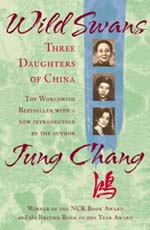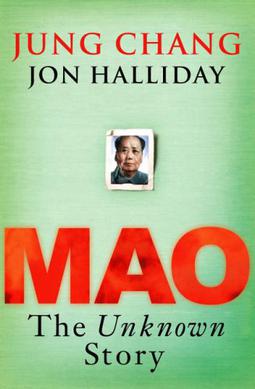| Revision as of 10:55, 17 April 2007 editXiaodingjin (talk | contribs)31 edits →See also← Previous edit | Revision as of 17:36, 17 April 2007 edit undoXiaodingjin (talk | contribs)31 edits →See alsoNext edit → |
| (7 intermediate revisions by 4 users not shown) | |
| (No difference) | |
Revision as of 17:36, 17 April 2007
Jung Chang (Traditional Chinese: 張戎, Simplified Chinese: 张戎, Wade-Giles: Chang Jung, Pinyin: Zhāng Róng; born March 25, 1952) is a Chinese-born British writer, best known for her family autobiography Wild Swans, selling over 10 million copies worldwide but banned in mainland China.
Her 832-page biography of Mao Zedong, Mao: The Unknown Story, written with her husband, the British Soviet historian Jon Halliday, was published in June 2005 and is a highly critical description of Mao Zedong's life and work.
Life in China
Chang was born March 25, 1952 in Yibin, Sichuan Province, China. Her parents were both Communist Party of China officials, and her father was greatly interested in literature. She quickly developed a love of reading and writing, composing poetry as a child.
As Party cadres, life was relatively good for her family at first; her parents worked hard, and her father became successful at a regional level. His formal ranking was as a "level 10 official", meaning that he was one of 20,000 or so most important cadres in the country. The Communist Party provided her family with a dwelling in a guarded, walled compound, a maid and chauffeur, as well as a wet-nurse and nanny for the children.
Her given name, Er-hong (二鸿 "Second Swan"), sounded like the Chinese word for "faded red". As communists were "deep red", the young Er-hong, at the age of 12, asked her father to give her a new name. She wanted a name with "a military ring to it." He suggested "Jung", which means "martial affairs."
The Cultural Revolution
Like many of her peers, Chang chose to become a Red Guard at the age of 14, during the early years of the Cultural Revolution. In Wild Swans she said she was "keen to do so", "thrilled by my red armband". But Chang also described how she refused to participate in the attacks on her teachers and other Chinese, and she left after a short period as she found the Guards too violent.
The failures of the Great Leap Forward had led her parents to oppose Mao Zedong's policies, though not him by name. During the Cultural Revolution, they were targeted as most high-ranking officials were. When Chang's father criticised Mao by name, Chang writes in Wild Swans that this exposed them to retaliation from Mao Zedong's supporters. Both were publicly humiliated — ink was poured over their heads, they were forced to wear placards round their necks, kneel in gravel and to stand outside in the rain — followed by imprisonment, her father's treatment leading to lasting physical and mental illness. Their careers were destroyed, and her family was forced to leave their home.
Before her parents' denunciation and imprisonment, Chang had unquestionably supported Mao like most Chinese. But by the time of his death, her respect for him had been destroyed. She wrote that when she heard he had died, she had to bury her head in the shoulder of another student to pretend she was grieving.
The Chinese seemed to be mourning Mao in a heartfelt fashion. But I wondered how many of their tears were genuine. People had practiced acting to such a degree that they confused it with their true feelings. Weeping for Mao was perhaps just another programmed act in their programmed lives.
Studying English
Chang was unable to go to university once the Cultural Revolution had started due to the disruption of the university system by the Red Guards. Instead, she spent several years as a barefoot doctor (a part-time peasant doctor), a steelworker and an electrician, though she received no formal training because of Mao's policy, which did not require formal instruction as a prerequisite for such work.
The universities were eventually re-opened and she gained a place at Sichuan University to study English, later becoming an assistant lecturer there. After Mao's death, she passed an exam which allowed her to study in the West, and her application to leave China was approved once her father was politically rehabilitated.
Life in Britain
Academic background
Chang left China in 1978 to study in Britain on a government scholarship, staying first in Soho, London. She later moved to Yorkshire, studying linguistics at the University of York with a scholarship from the university itself, living in Derwent College. She received her Ph.D. in linguistics from York in 1982, becoming the first person from the People's Republic of China to be awarded a Ph.D. from a British university.
She has also been awarded honorary doctorates from the University of Buckingham, the University of York, the University of Warwick, and the Open University. She lectured for some time at the School of Oriental and African Studies in London, before retiring in the 1990s to concentrate on her writing.
New experiences
In 2003, Jung Chang wrote a new foreword to Wild Swans, describing her early life in Britain and explaining why she wrote the book. Having lived in China during the 1960s and 1970s, she found Britain exciting. After the initial culture-shock, she soon grew to love the country, especially its diverse range of culture, literature and arts. She found even colourful window-boxes worth writing home about - Hyde Park and the Kew Gardens were inspiring. She took every opportunity to watch Shakespeare's plays in both London and York. However she still has a special place for China in her heart, saying in an interview with HarperCollins, "I feel perhaps my heart is still in China".
Chang lives in West London with her husband, the British historian Jon Halliday, who specializes in Soviet history. She regularly visits mainland China to see her family and friends there, with permission from the Chinese authorities, despite carrying out research on her biography of Mao there.
Celebrity
The publication of Jung Chang's first book Wild Swans made her a celebrity. Chang's unique style, using a personal description of the life of three generations of Chinese women to highlight the many changes that the country went through, proved to be highly successful. Large numbers of sales were generated, and the book's popularity led to it being sold around the world and translated into several languages.
Chang became a popular figure for talks about Communist China, and she has travelled across Britain, Europe, America, as well as the rest of the world. She returned to the University of York on June 14, 2005 to address the university's debating union. Hundreds of students turned out to meet her, including dozens of Chinese exchange students. The BBC invited her onto the panel of Question Time for a first-ever broadcast from Shanghai on 10 March 2005 , but she was unable to attend when she broke her leg a few days beforehand.
Publications
Wild Swans

The international bestseller was a biography of three generations of Chinese women in 20th century China — her grandmother, mother, and herself. Chang paints a vivid portrait of the political and military turmoil of China in this period, from the marriage of her grandmother to a warlord, to her mother's experience of Japanese-occupied Jinzhou during the Second Sino-Japanese War, and her own experience of the effects of Mao's policies of the 1950s and 1960s.
Wild Swans was translated into 30 languages and sold 10 million copies, receiving praise from authors such as J. G. Ballard. It is banned in mainland China, though two pirated versions are available, as are translations in Hong Kong and Taiwan.
Mao: The Unknown Story
Main article: Mao: The Unknown Story
Chang's latest work, a biography of Mao, was co-authored by her husband Jon Halliday and is highly critical of Mao's rule. Halliday had praised Maoism in Japanese Imperialism Today, which he co-authored with Gavan McCormack in 1973, but his view changed over time like that of his wife.
Amongst their criticism of Mao, Chang and Halliday argue that despite being born into a peasant family, he had little concern for the welfare of the Chinese peasantry. They hold Mao responsible for the famine resulting from the Great Leap Forward and claim that he exacerbated the famine by allowing the export of grain to continue even when it became clear that China did not have sufficient grain to feed its population. They also claim that Mao had many political opponents arrested and murdered, including some of his personal friends, and argue that he was a more tyrannical leader than had previously been thought.
Academic opinion on the book was divided. Perry Link, Professor of East Asian Studies at Princeton University, wrote a laudatory review in The Times Literary Supplement. Michael Yahuda, Professor Emeritus in International Relations at the London School of Economics, also expressed his support in The Guardian, calling it a "magnificent book" and "a stupendous work". Professor R. J. Rummel of the University of Hawaii published updated figures on world-wide democide in 2005, stating that he believed Chang and Halliday's estimates to be mostly correct.
On the other hand Thomas Bernstein of Columbia University remarked that "the book a major disaster for the contemporary China field". Philip Short (author of Mao: A Life) criticised Chang and Halliday, arguing that they had reduced Mao from a complex historical character to a one-dimensional "cardboard cutout of Satan" and that Chang was guilty of "writing history to fit views". Andrew Nathan, Professor and Chair of the Department of Political Science at Columbia University, wrote a lengthy review in the London Review of Books that raised many criticisms, including questions about the difficulty in verifying the sources used and problems with their quality. However, he did also express interest in the book's thorough use of memoirs published since Mao's death, suggesting that they and other similar sources may prove useful references in the future. Jonathan Spence's criticism (Professor of history at Yale University) in the New York Review of Books was that focusing on Mao's vileness had undermined "much of the power their story might have had."
Chang responded to the criticism, pointing out that she and her husband were shocked at what they discovered during the 10 years they spent researching the book. Halliday is an historian specializing in the Soviet Union, and he said that he was greatly helped by accessing Russian archives on China that were inaccessible until recently. Chang travelled several times to China during the course of her research, interviewing many of those who were close to Mao, as well as alleged eyewitnesses to events such as the crossing of Luding Bridge.
List of works
- Jung Chang and Jon Halliday, Madame Sun Yat-Sen: Soong Ching-Ling (London, 1986); Penguin, ISBN 0-14-008455-X
- Jung Chang, Wild Swans: Three Daughters of China (London, 1992); 2004 Harper Perennial ed. ISBN 0-00-717615-5
- Jung Chang and Jon Halliday, Mao: The Unknown Story (London, 2005); Jonathan Cape, ISBN 0-679-42271-4
- Jung Chang, Lynn Pan and Henry Zhao (edited by Jessie Lim and Li Yan), Another province: new Chinese writing from London (London, 1994); Lambeth Chinese Community Association, ISBN 0-9522973-0-2.
References
- Jung Chang, Wild Swans: Three Daughters of China (London, 2004), p. 378.
- Wild Swans, p. 633.
- Perry Link (2005-08-14). "An abnormal mind". The Times Literary Supplement. Retrieved 2007-04-04.
- Michael Yahuda (2005-06-04). "Bad element". The Guardian. Retrieved 2007-04-04.
- R.J. Rummel (2005-12-01). "Stalin Exceeded Hitler in Monstrous Evil; Mao Beat Out Stalin". Hawaii Reporter). Retrieved 2007-04-09.
- A swan's little book of ire. October 2005
- Andrew Nathan (2005-11-17). "Jade and Plastic". London Review of Books. Retrieved 2007-04-04.
- Jonathan Spence (2005-11-03). "Portrait of a Monster". The New York Review of Books. Retrieved 2007-04-04.
See also
A Chinese Critique of Jung Chang’s "Mao, the Unknown Story"
Categories: